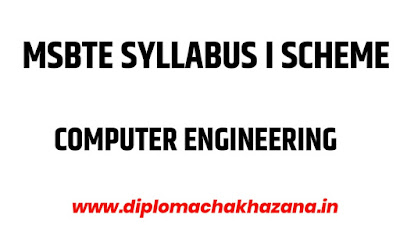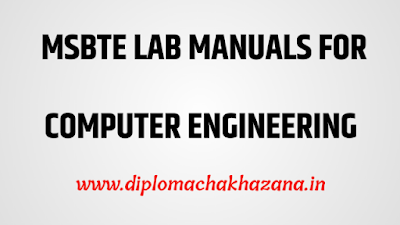MSBTE Question Paper I Scheme for Diploma in Automobile Engineering students is available in this post. Students can download the papers and practice for the upcoming MSBTE exam. This paper can be very helpful to score very good marks in the exam. Many Automobile Branch students feel difficulty to download MSBTE previous year question papers from the official website of Maharashtra State Board Of Technical Education so we have sorted this papers semester wise and you don't need to know the subject code to download the papers. Even if you know the subject name you can download it from this post. If you solve this paper and then go for the exam you might score higher than other students.
Other MSBTE Study Resources for Automobile Branch
1.MSBTE Automobile Engineering Syllabus
2.MSBTE Automobile Engineering Lab Manual
1.MSBTE Automobile Engineering Syllabus
2.MSBTE Automobile Engineering Lab Manual
MSBTE Previous Year Question Papers for the first semester of Automobile Branch
22103 Basic Mathematics Previous Year Question Paper
22101 English Previous Year Question Paper
MSBTE Previous Year Question Papers for the second semester of Automobile Branch
22206 Applied Mathematics Previous Year Question Paper
22207 Engineering Drawing Previous Year Question Paper
22203 Applied Mechanics Previous Year Question Paper
MSBTE Previous Year Question Papers for the third semester of Automobile Branch
22306 Strength of Material Previous Year Question Paper
22320 Digital Technique Previous Year Question Paper
22310 Basic Electrical and Electronics Previous Year Question Paper
22308 Automobile Engine Previous Year Question Paper
22329 Applied Electronics Previous Year Question Paper
MSBTE Previous Year Question Papers for the fourth semester of Automobile Branch
22441 Heat Power Engineering Previous Year Question Paper
22442 Automobile Systems and Body Engineering Previous Year Question
Paper
22440 Advanced Automobile Engines Previous Year Question Paper
MSBTE Previous Year Question Papers for the fifth semester of Automobile Branch
22559 Two and Three Wheeler Technologies Previous Year Question Paper
22557 Transport Management and Motor Vehicle Act Previous Year Question
Paper
22561 Aut0mobile Body Engineering and Safety Previous Year Question
Paper
MSBTE Previous Year Question Papers for the sixth semester of Automobile Branch
Students please not that question papers for 6th semesters are not available
but you can
download sample papers
which are also good option for practice
click here
Important Question And Answers
1.Automobile Engineering and Mechanical Engineering difference
Ans:-Automobile engineering and mechanical engineering are two closely related
fields, but there are some significant differences between them.
Automobile engineering is a specialized branch of engineering that deals with
the design, development, manufacturing, and maintenance of automobiles,
including cars, trucks, buses, motorcycles, and other motorized vehicles.
Automobile engineering encompasses various disciplines such as mechanical,
electrical, electronic, and computer engineering, and it focuses specifically
on the automotive industry.
On the other hand, mechanical engineering is a broad field of engineering that
deals with the design, development, and manufacturing of various mechanical
systems, including engines, machinery, robotics, and other mechanical
components. Mechanical engineering covers a wide range of industries such as
aerospace, manufacturing, energy, and automotive.
The primary difference between automobile engineering and mechanical
engineering is that automobile engineering is a specialized field that focuses
specifically on the automotive industry, while mechanical engineering is a
broad field that covers many different industries. Automobile engineering
requires a thorough understanding of automotive systems, including engine
design, transmission, suspension, brakes, and electronics, whereas mechanical
engineering involves the design and development of mechanical systems that can
be used in various industries.
In summary, automobile engineering is a specialized field of mechanical
engineering that focuses specifically on the automotive industry, whereas
mechanical engineering is a broader field that encompasses various industries
and applications.
2.Automobile Engineering average salary in India
Ans:-The salary of an automobile engineer in India can vary depending on
several factors, such as education, experience, location, and the type of
industry they work in. On average, an entry-level automobile engineer can
expect to earn around INR 3-5 lakhs per annum. However, with experience and
expertise, the salary can go up to INR 10-20 lakhs per annum or even higher.
The automotive industry is one of the fastest-growing sectors in India, with
many domestic and international automobile manufacturers setting up their
production units in the country. This has led to an increase in demand for
skilled automobile engineers, which has resulted in a rise in salaries.
Additionally, the government's emphasis on promoting electric vehicles in the
country has also led to the growth of new job opportunities in the automobile
sector.
Furthermore, location plays a significant role in determining the salary of an
automobile engineer in India. Cities like Bangalore, Pune, Chennai, and
Mumbai, which are the major hubs for the automotive industry, offer higher
salaries compared to other cities in the country.
Overall, the salary of an automobile engineer in India is competitive, and
with the growth of the automotive industry in the country, the prospects of a
lucrative career in this field are promising.
3.What are the different types of Automobile Engineering Jobs?
Ans:-The automotive industry is a vast field that offers a wide range of job
opportunities for automobile engineers. Here are some of the different types
of automobile engineering jobs:
Design Engineer: Design engineers are responsible for designing and developing
various components of automobiles, such as engines, transmissions,
suspensions, and body structures. They use computer-aided design (CAD)
software to create 2D and 3D models of their designs and work closely with
other engineers and technicians to ensure that their designs meet the required
performance, safety, and cost targets.
Manufacturing Engineer: Manufacturing engineers are responsible for designing
and developing production processes and systems to manufacture automobiles
efficiently and cost-effectively. They use their expertise in mechanical,
electrical, and industrial engineering to develop automated production lines
and optimize manufacturing processes.
Quality Control Engineer: Quality control engineers are responsible for
ensuring that the automobiles manufactured meet the required quality
standards. They use various quality control tools and techniques to inspect
and test the components and systems of the automobiles and ensure that they
meet the required specifications and standards.
Sales Engineer: Sales engineers are responsible for selling automobiles to
customers and dealers. They use their knowledge of the technical
specifications and features of automobiles to explain their benefits to
potential customers and help them make informed purchasing decisions.
Service Engineer: Service engineers are responsible for providing after-sales
service and support to customers. They diagnose and troubleshoot problems in
automobiles and repair or replace faulty components to ensure that the
vehicles are functioning correctly.
Research and Development Engineer: Research and development engineers are
responsible for conducting research and development activities to improve the
performance, efficiency, and safety of automobiles. They work on developing
new technologies, materials, and processes that can be used in the production
of automobiles.
Overall, the automotive industry offers a diverse range of job opportunities
for automobile engineers, and with the growing demand for electric and
autonomous vehicles, the prospects of a career in this field are promising.
Conclusion:-
Polytechnic Automobile Engineering students can download the question
papers and solve them to prepare for the final exam.










0 Comments
Please feel free to comment. Being diploma students We are always ready to help diploma Students